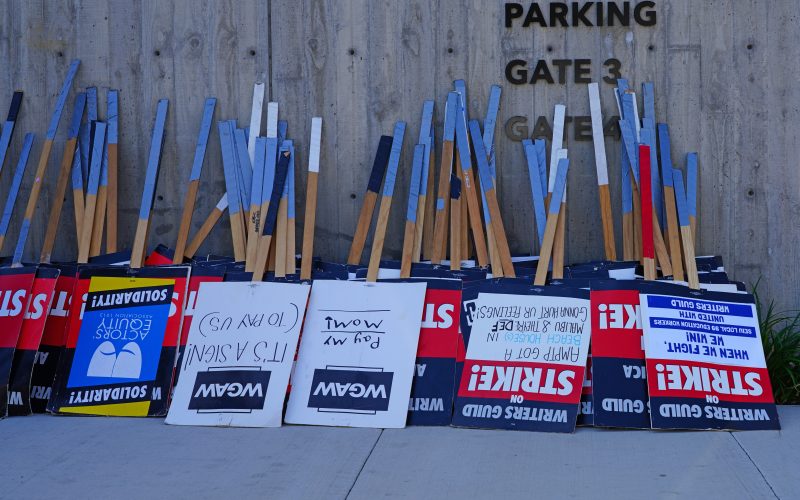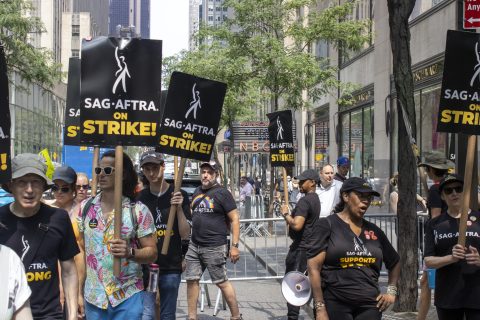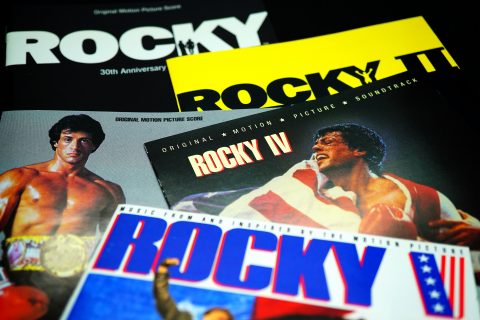The Writers Guild of America strike was settled – so why is selling screenplays in Hollywood harder than ever? Daniel Bessner is a contributor to Harper’s Magazine and an associate professor at the University of Washington’s Henry M. Jackson School of International Studies. He joins host Krys Boyd to discuss how investors are changing the business landscape for television and movie writers – and the ways writers hustle for any work. His article is “The Life and Death of Hollywood.”
The deregulation of Hollywood and how it’s affected writers
By Shaunessy Renker, Think intern
Have you ever wondered why there are so many remakes or spinoffs of films and television series these days? Hundreds of movies are released every year but many of them seem to be a part of a larger fictional universe. Well, there might be an economical explanation for this phenomenon.
Daniel Bessner, contributor to Harper’s Magazine and author of “The Life and Death of Hollywood,” says that the rise of neoliberal ideology in the 1980s led to the deregulation of the media industry. During the Reagan and Clinton administrations, the entry of high finance into Hollywood supercharged trends such as hyper-monopolization and what historians call “financialization.”
Bessner says that the entire political economy of Hollywood has been organized in such a way where the winners win and everyone else effectively loses out. He calls it the “Winner Takes All Economy.” A-list writers such as Shonda Rhimes or Ryan Murphy are examples of winners who struck deals worth millions of dollars. ‘Winners’ could also be identified as the ruling class of media companies and financial firms who rather than reinvest in labor and business, spend their money on corporate venture capital processes.
Even the rung of writers directly below household names like David Chase have essentially no job security despite being highly lauded.
“Writing in Hollywood has been in effect gig work,” says Daniel Bessner. “As time goes on the regulated capitalism has been replaced by a deregulated, financialized capitalism that has in many industries destroyed the ability for ordinary workers to make a living.”
He says that the rest of the creative economy – industries such as journalism and academia – have begun to resemble the gig economy of Hollywood.
According to research conducted by the Writers Guild of America, the median writer pay has declined by approximately 23% in the last decade.
“When looking at asset management companies that are the largest stakeholders in a lot of media corporations, ‘the Big Three’ as scholars refer to them – BlackRock, Vanguard, and State Street – often run the largest stakes in competing companies,” says Bessner.
Over time, the climate of Hollywood as evolved in that these media companies aren’t truly in competition with one another. Bessner says this results in the production of less exciting and original art and less commercially successful products. This is evident especially right now in the decline of successful intellectual property films and the increase of films with preexisting characters.
Private equity firms purchase studios and then direct their focus toward efficiency which Bessner says in neoliberal capitalism, means cutting labor costs.
“Private equity firms have a direct effect on what is being produced and how much the writers are being paid,” he says. “They come in and there’s less of a willingness to pay writers, there’s more pressure on writers’ quotes, and they don’t honor how much pay the writers deserve according to their status in the industry.”
Bessner says a phenomenon called “The Shareholder Revolution” has taken over Hollywood for the worst where the focus geared toward ‘short-term time horizons.’ Rather than developing a writer’s career over the course of decades, agencies now want fully developed writers even though this wasn’t always the case.
“So in these diverse ways, financialization, ‘The Shareholder Revolution,’ and monopolization work together to make it very difficult for ordinary people to enter and sustain a career as writers in Hollywood,” Bessner concludes.





